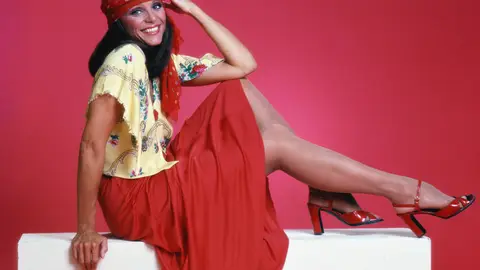Remembering Valerie Harper: A Gay Icon and Our Eternal Best Friend

The actress Valerie Harper died on August 30 at the age of 80, and a few generations of TV viewers felt like they lost a best friend.
Harper played Rhoda, upstairs neighbor to Mary Richards (Mary Tyler Moore) on The Mary Tyler Moore Show, one of the greatest sidekicks in television history. She was blunt and sarcastic—relentlessly self-deprecating about her looks and her weight—but she was also warm and loyal. She always seemed halfway toward loving herself, but you knew why she should get there tomorrow. If there was something lovable about you, she'd broadcast it; if you were full of shit, she was the original master reader for filth.
She burst the blister of shame that surrounded being the “other”—single, more than a size 6, past a certain age—with laser-sharp awareness, and not just an awareness of herself but of society's absurd pressures. Turning down pre-party snacks, she said, "I've got to lose 10 pounds by 8:30." That was just one of dozens (hundreds?) of iconic Rhoda-isms. Rhoda was the underdog every alpha wanted to be.
And you got a sense that she was a great friend to the gays. That suspicion was confirmed in the third season, when Rhoda uttered a groundbreakingly supportive line about gay people.
The original blueprint for The Mary Tyler Moore Show was even more reflective of post-sexual-revolution reality than what showed up on screen. Mary Richards was supposed to be divorced; apocryphally, Murray the newswriter (Gavin MacLeod) was envisioned as gay. Those characters were softened and reconceived to fit network standards. But the show was still as queer as could be for 9 p.m. on network TV in the 1970s—and that was because of Rhoda.
Valerie Harper in 1975.
Harper was one of the first people, perhaps the first, to say "gay" on a sitcom. It happened in the 1973 episode "My Brother's Keeper," in which the operatically high-strung Phyllis (Cloris Leachman) frets that her handsome brother is hanging out with, and falling for, down-to-earth Rhoda instead of vaunted Mary, as she intended. In the penultimate scene, Rhoda tells Phyllis she won't be marrying Phyllis' brother; he isn't her type. Phyllis becomes indignant.
Phyllis: What do you mean he's not your type? He's witty! He's attractive! He's successful! He's single!
Rhoda: He's gay!
(The studio audience's laughter went on so long it had to be edited down.)
Phyllis: He's what?
Rhoda: He's gay! I thought for sure you knew, Phyl. We're not getting married.
Phyllis: Oh Rhoda, I'm so relieved!
Harper later said it was her favorite episode. In a 2009 interview for the Television Academy, she talked about how she chose to say,"He's gay.” The director, Jay Sandrich, suggested she might want to use a hushed tone. "I said no!," Harper recalled. "It was like saying, 'He's a Jesuit!'… or 'He's married!' There wasn't any embarrassment. It was [Rhoda's] sensibility."
A Broadway chorus dancer and veteran of the Second City improv troupe, Harper was plucked from obscurity by casting legend Ethel Winant, the first female vice president of CBS. Winant was so impressed by early scripts for The Mary Tyler Moore Show that she decided to cast the show herself, remembering Harper from an anonymous comedy revue in which she played characters including a teenage Eva Braun.
Two Emmys later, Harper and Rhoda were so beloved that Harper got her own spinoff. Rhoda the sitcom was an out-of-the-gate phenomenon: Fifty-two million people watched the Season 1 episode in which Rhoda rode the subway and dashed through the streets of New York City in her wedding gown on the way to her marriage ceremony. It's still a TV-audience record.
Harper won another Emmy for Rhoda, but ultimately the show didn't serve her or the character well, breaking up Rhoda's marriage and folding her window-dressing business. It wasn't how we wanted to see our best friend treated.
Valerie Harper didn't get the TV treatment she deserved either. She was fired from her own show, Valerie, after a 1987 contract dispute, although the parties involved later reconciled. She starred in two very funny, unjustly short-lived sitcoms: 1990's City and 1995's The Office (no relation to the later long-running hit). She made a memorable cameo in the Season 3 episode of Sex and the City "Shortcomings" and popped up in shows like Desperate Housewives and Hot in Cleveland. A pilot to revive Mary and Rhoda in a dramedy called Mary and Rhoda never got off the ground.
Mary Tyler Moore (L) and Valerie Harper in The Mary Tyler Moore Show.
How we wanted to see her catch a career second wind and pull a Betty White! For a while, it looked like it might happen. She got great reviews and a Tony nomination for Looped, a one-woman play about Tallulah Bankhead that ran on Broadway in 2010. She then discovered she had lung cancer. In 2013, she announced she'd been diagnosed with leptomeningeal carcinomatosis, a form of brain cancer, and given three months to live.
She outlived that prognosis by six years, even competing on Dancing With the Stars along the way—a total Rhoda move.
"Rhoda was, like most of us, a victorious loser," said Harper. "She thought of herself as a loser, but she kept in the game of life fully. She had a marvelous sense of humor. She would say the unsayable."
She added: "I think Rhoda Morgenstern appealed to people, because all of us—men, women, gay, straight, black, white, young, old—knew that they felt like Rhoda felt at some time in their life. And that most of us are just trying to get through."





